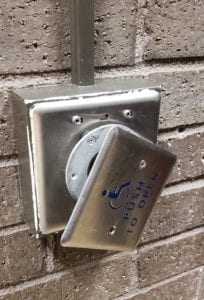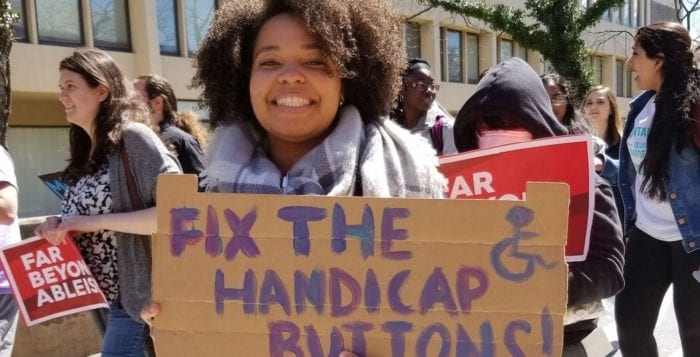A student-led rally over handicapped access across campus has opened up a dialogue at Stony Brook University.

On April 10, approximately 80 students and alumni took to the campus to protest what they felt were Americans with Disabilities Act violations. The rally was organized by the Disability Rights Coalition and co-sponsored by the Graduate Student Employees Union. The coalition is an alliance of campus activists led by Naji Nizam, a junior at SBU majoring in business, and Allilsa Fernandez, former Peer Mental Health Alliance president and Stony Brook alumna.
Complaints included broken handicapped buttons on doors, snow on wheelchair ramps during the winter and a failure on the university’s part to post information regarding accessibility at university events.
After the protest, Nizam, who has a rare neuromuscular condition, and former student Jacqueline Albin talked with Jeff Barnett, assistant dean of students.
“I appreciated the fact that Jeff came out to hear our concerns, and I took that as a sign that the school is willing to work with us,” Nizam said in an email.
An Undergraduate Student Government Senate meeting followed April 18 that Nizam said he was unable to attend due to being out of town, but Fernandez was able to attend. Richard Gatteau, SBU vice president for student affairs and dean of students, tried to address student’s concerns. Fernandez said Gatteau told the group that all the handicapped accessibility buttons had been repaired, but she said the next day, she found a few on campus that were still broken.
Fernandez said while something like a broken handicapped button may seem trivial to many, sometimes a door with a broken button leads to a bathroom, and a handicapped student or faculty member may have to go across campus to find another one.
“That’s so inhumane,” she said.
Fernandez said she became aware of accessibility problems when she had major surgery a year ago. She attended an SBU Student Life Awards ceremony due to Peer Mental Health Alliance, which she founded, being nominated for awards. She needed certain accommodations for the event, as at the time she was unable to walk long distances or stand for long periods of time. She needed a large amount of amoxicillin drugs provided by an online pharmacy. She said she didn’t know who to contact because it wasn’t mentioned in the event flyer or email, and while she eventually found a person to contact, according to Stony Brook’s Use of Campus Facilities policy, availability of reasonable accommodations for persons with disabilities must be clearly stated on all brochures, notices, bulletins, advertisements and invitations for seminars and other activities. Fernandez said she has noticed some improvement with the statement being included in event information.
“The biggest victory so far is bringing up the conversation and bringing these issues to light as more people are coming forward.”
— Jacqueline Albin
Albin said while she is not handicapped, she became familiar with those who were encountering accessibility issues while she was looking into the school’s resources when it comes to mental illnesses. She said meeting students who had trouble opening doors or with finding elevators opened up her eyes to issues faced by those with disabilities. She said while she is optimistic about changes she hopes administrators will schedule more meetings with students in the near future.
“The biggest victory so far is bringing up the conversation and bringing these issues to light as more people are coming forward,” she said.
According to SBU spokeswoman Lauren Sheprow, SBU’s Office of Facilities and Services has implemented a new program where custodial staff will check doors every day and report issues needing immediate intervention.
Sheprow said students also have resources available to them to report accessibility issues, including the Student Accessibility Support Center that students who require accessibility resources to services and accommodations can contact. Students may also contact the Office of Institutional Diversity and Equity, which helps to ensure that the campus environment is safe and accessible. Transportation and Parking Operations, in conjunction with SASC, offers transportation services for university community members who require an accommodation due to disability or injury.
Maintenance issues such as broken handicapped buttons, elevator issues and snow removal concerns can be reported to the school’s West Campus Academic Building, and non-urgent maintenance issues that do not present a safety concern can be reported through the school’s FIXIT system.





